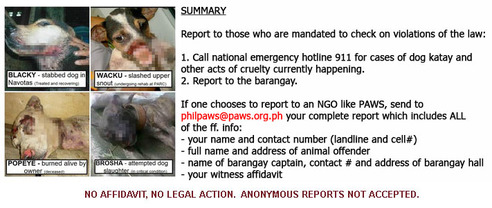Animal cruelty is a pressing concern that commands the attention of societies worldwide. In the Philippines, as in many countries, there exists a serious commitment to protect animals, embodied in legislation and the tireless efforts of non-governmental organizations (NGOs). Understanding how to report instances of animal cruelty is essential for fostering a society that respects and protects its vulnerable creatures. This article serves as a comprehensive guide to navigating the reporting process, highlighting pertinent laws, available hotlines, and the role of various NGOs.
First and foremost, one must grasp the definition of animal cruelty as understood within the Filipino legal framework. The Republic Act No. 8485, known as the Animal Welfare Act of 1998, defines acts of cruelty toward animals, encompassing not only physical abuse but also neglect and insufficient care. This legislation underscores the obligation of individuals to ensure the welfare of animals under their stewardship. The law mandates humane treatment and forbids actions that might compromise the well-being of any animal, including abandonment, undue suffering, and killing without just cause.
Understanding the legal backbone of animal welfare legislation is vital as it informs how individuals can act upon witnessing cruelty. When a person observes or suspects animal cruelty, they are encouraged to report it promptly. This ensures that the situation is addressed before it escalates further. The Philippine National Police (PNP) and local government units are critical conduits for these reports. Established within the PNP is a special unit dedicated to investigating animal cruelty cases. This is a positive step toward creating a legal environment that actively discourages maltreatment of animals.
For immediate reporting, individuals can reach out to the PNP through their national hotline at 117. This number is a crucial lifeline, offering a direct line to authorities who are now trained to respond to issues of animal cruelty. It is imperative to provide as much detail as possible when making the report. Documentation, including photographs, videos, or independent witness accounts, can significantly bolster a report’s credibility and urgency.
In addition to reporting to the authorities, numerous NGOs specialize in animal welfare and play a vital role in investigating complaints. Organizations like the Philippine Animal Welfare Society (PAWS) offer resources for citizens seeking to report animal abuse. PAWS has established a hotline, which is another critical channel for reporting cases of animal cruelty. By contacting PAWS, individuals not only ensure that their reports reach dedicated animal welfare advocates but also contribute to a broader movement aiming to eradicate cruelty. These organizations are often best positioned to offer guidance on how to proceed with legal and humane options related to animal rescue and care.
The existence of such NGOs speaks to a deeper societal recognition of the intrinsic value of animals and the moral imperative to protect them. Animal rights advocates see animals as sentient beings deserving of compassion and consideration. This compassion resonates profoundly in Filipino culture, where familial and communal values extend to the treatment of pets and animals alike. Nonetheless, disparate attitudes towards animals persist, often informed by socioeconomic conditions and cultural practices, which can inadvertently lead to neglect or abuse.
It is worth noting that the effectiveness of reporting animal cruelty hinges not only on the legal framework but also on public awareness and education. Communities must be educated about what constitutes animal cruelty and the importance of reporting it. This responsibility does not merely rest with individual citizens but extends to educational institutions and local governments. Workshops and seminars on animal welfare can empower citizens to take action when they witness maltreatment.
Furthermore, the legal ramifications for animal cruelty perpetrators serve as both a deterrent and a call to action. Under the Animal Welfare Act, penalties can include fines and imprisonment, underscoring society’s intolerance towards such behavior. However, enforcement remains inconsistent in some areas. This prompts a collaborative effort, uniting citizens, NGOs, and local authorities, to create a robust network that fosters accountability and humane treatment.
For those who wish to engage deeper in the fight against animal cruelty, volunteering at NGOs can provide hands-on experience and further insight into the challenges faced by these organizations. Many NGOs operate shelters, rescue initiatives, and outreach programs, which need volunteers to help care for animals in distress and to promote animal welfare advocacy. By becoming involved, individuals can amplify their impact, forging connections among like-minded advocates striving for change and fostering a deeper understanding of the issues at play.
In conclusion, effectively reporting animal cruelty in the Philippines requires a multi-faceted approach, blending awareness, education, and legal compliance. Hotlines established by both the PNP and NGOs serve as lifelines for innocent creatures in need. Furthermore, community involvement and the support of dedicated organizations are paramount in building a society that not only recognizes the importance of animal welfare but acts decisively to protect it. The journey toward eradicating animal cruelty is ongoing, yet armed with knowledge and compassion, individuals can make substantial contributions to this noble cause.








